- Home
- Lisa Graff
A Clatter of Jars Page 2
A Clatter of Jars Read online
Page 2
Miles didn’t even glance at Lily before continuing his recitation. “Maevis Marion Marvallous. Sixty-seven years old as of her last birthday. Talent: Mimic. Able to duplicate the Talent of any person she comes in contact with for approximately one year.”
“Now you’ve set him off,” Renny muttered. “When Miles gets started on Talent history, good luck getting him to stop.”
“Fun fact,” Miles went on. “Maevis Marvallous alleges that she lost her Talent over three decades ago, although scholars debate the claim.”
Suddenly Lily noticed that Miles and Renny had the same sharp nose. Same auburn hair. Same pasty knees. Miles was a bit broader, but they were brothers, no question.
“I didn’t know there were two Fennelbridge kids,” Lily said. She was sure A Singular History had mentioned only one. “What’s his Talent?”
Renny halted midstride to tug at the top of his right sock. “Make enough Fennelbridges, and one of them’s bound to be Fair.” He let out a sour laugh. “That’s what our dad likes to say.”
“If you ask me,” Chuck chimed in, “there are two Fair kids in the Fennelbridge family.”
“What do you mean by that?” Renny snapped.
“You obviously stink at reading minds,” Chuck informed him. “I’ve been mentally threatening to pop you in the jaw for the past ten minutes, and you haven’t flinched once.”
Lily couldn’t help it. She laughed.
Oblivious to the awkwardness behind him, Del pointed to a sturdy building hewn from logs. “There’s the lodge,” he called back. “Meals are served on the mess deck. All-camp slumber party’s the second Friday of camp, and the Talent show’s that Sunday, before your parents take you home.”
At the mention of the Talent show, Lily’s heart snagged her chest. Maybe there was still time to come up with a new act to perform with Max.
A lot could happen in two weeks.
“The lodge also houses the office of our camp director, Jo,” Del continued. “She plays a mean harmonica.”
Miles broke from his Talent history just long enough to tell the dirt, “I play a nice harmonica. I learned last year in music. Cassandra Colby Donovan. Born 1851, died 1900. Talent: Quest. Fun fact: Cassandra Donovan was the Needle-in-a-Haystack champion of Baxley, Georgia, for forty years running, until they retired the competition.”
“Up ahead is the archery ring,” Del went on. “There’s the fire pit, where we hold our campfire each Friday. And if you squint, you can make out the lake through the trees.”
At that, Miles stopped walking. “No water!” he squeaked.
Del offered Miles a friendly smile. “What’s wrong with a little”—he spit into one hand and pressed his palms together before sprinkling miniature icicles in the dirt—“water?” He took in Miles’s alarmed expression. “Not a fan of a classic Numbing Talent, huh?” Del cleared his throat. The ice-spit at his feet was already melting in the sun. “Uh . . . canoes are available every day after breakfast, and if you feel like swimming, Jo encourages you to grab your towel any time of day and hop right in the water.”
“No water!”
Miles shrieked it that time. And he began flicking his fingers, too—flick-flick-flick-flick-flick!
Quick as lightning, Renny grabbed his brother’s hand. “You guys sell Caramel Crème bars at the camp store, right?” Renny asked Del. Miles’s fingers slowly ceased their flicking. “Miles loves Caramel Crème bars.”
“I want a Caramel Crème bar,” Miles said, pulling his hand free. If Lily hadn’t witnessed the scene herself, she’d never have believed that Miles had been in a near panic thirty seconds earlier.
“Uh . . .” Del scratched a spot below his ear. “What was the question again?”
“Caramel Crème bars,” Renny reminded him.
“Oh. Right.”
As Del went over the store’s hours, Lily wound the length of yarn around her thumb, watching Renny with his brother. Lily had tied the yarn around her thumb three weeks ago. Since then, the lime green strands had turned swampy, thinning and separating, and the skin underneath had grown raw from constant rubbing. It had stung for some time, like a blister—insistent, sharp, painful. But Lily hadn’t untied it.
She tugged her duffel farther up her aching shoulder, her attention stolen by the music drifting through one of the lodge’s windows. It was a song Lily was quite familiar with. This was an instrumental version, without lyrics, but Lily knew the words by heart.
Los golpes en la vida
preparan nuestros corazones
como el fuego forja al acero.
Lily and Max’s father had sung them the melancholy lullaby countless times, on nights when he wasn’t traveling for work. When he sang the tune, the notes swept you up and cradled you, made you feel safe.
(“Why do you always have to travel?” Lily had asked him last year, when he’d been in Prague instead of her school auditorium for the opening ceremony of the Talent festival. He’d responded as he always did. Not that it was his job—not that he had to be away so often, that he had no choice—but rather: “Oh, Liria. Traveling helps ease my heartache.” Which didn’t explain why her father had begun his travels long before he and Lily’s mother had been married.)
Lily let the words of the song sink in. Her father had translated the lyrics for her once, but she never felt she truly understood them in any language.
The blows of life
prepare our hearts
like fire forges iron.
Summer camp, Lily thought, pulling herself from the music to rejoin the tour, didn’t seem like a place for melancholy songs.
When they reached Cabin Eight, Del creaked open the door and let them inside.
“Cordelia Fabius Sibson,” Miles said as he entered the cabin. “Eighty-two years old as of her last birthday. Talent: Scribe.”
Lily wound the length of yarn around her right thumb, staring at the three bunks that lined the cabin walls.
Three bunks.
Six beds.
“Are we waiting for another camper?” Chuck asked Del. “There are six beds, and only five of us.”
“The assignments for this cabin were a little odd,” Del admitted. “I don’t know what Jo was thinking, but you don’t question Jo. Anyway, you were supposed to have one more cabinmate, but at the last minute, he—”
Lily dropped her duffel with a heavy thunk. “I need to go to the infirmary,” she said.
“You okay?” Del asked, stitching his eyebrows together.
“I have to go,” Lily repeated. And she squeezed past him out the door, racing down the path. Kicking up dirt.
It should have been Max in that sixth bed. It should have been their summer together, while Hannah the housefly was far off in a different cabin, buzzing at someone else. But they weren’t together, because three weeks ago, Max had gotten hurt.
Around and around went the length of yarn.
Lily was the one who’d hurt him.
Jo
JOLENE MALLORY DUG HER HAND DEEP INTO THE pocket of her knitted sweater, retrieving her harmonica. The instrument was well used and well loved, silver, scuffed, and slightly dented at one end.
Running her thumb over the harmonica’s mouthpiece, Jo let her gaze settle on the smattering of sample-size glass jars that sat on her office shelves. Soon those shelves would be overflowing with hundreds of identical jars, carefully labeled and sorted. At the moment, however, there were a mere half dozen. Each jar was hardly larger than a Ping-Pong ball, with the words Darlington Peanut Butter embossed on the bottom. And to most people, they would have appeared empty.
Jolene Mallory was not most people.
Her gaze fixed upon the leftmost jar, Jo put the harmonica to her lips and, ignoring the sounds of the three hundred campers arriving for the first session of the summer, she began to play.
; Los golpes en la vida
preparan nuestros corazo—
“You think you’d get sick of that song, after a while.”
Jo swiveled around to face the man in the doorway, who was holding a familiar briefcase. “I thought I locked that door, Caleb,” she growled.
Caleb studied his nails, as though thoroughly bored by the conversation already. “You did. You also sold me a Talent for lock-picking last week.”
Jo drew a deep breath, which resulted in an accidental waaaaah from her harmonica. With the note, Jo saw a swirl of color around Caleb’s scalp. Sunshine yellow, with streaks of puce.
Lock-picking, indeed.
“Shut the door,” she told him.
“I brought someone along to meet you,” Caleb replied. At his insistence, a boy, about five years old, stepped into the doorway. The child clung to Caleb’s side.
“This isn’t a day care,” Jo said.
“Danny’s my nephew. You’ll like him.” When Jo scowled, Caleb let out a truffly laugh. “Well, maybe you won’t, but most people do. Only one thing.” Caleb mussed the boy’s hair. “Hasn’t found his Talent yet.”
Danny gazed up at Jo with big, wet eyes.
“I don’t do party tricks,” Jo informed them.
“No, of course not. Only business.” Caleb examined the shelf along the wall, his eyes narrowed as though working through careful calculations. “How many jars is that you have to sell me today?” he asked. “Twenty?”
Jo flipped the harmonica end over end. The instrument was shiniest near the edges, where so many fingers had handled it. Her grandma Esther had bought the harmonica at an antique store in Istanbul over seventy years ago, from a fool who didn’t realize its value. That and a gold pocket watch, similarly purchased, had been the heart of Grandma Esther’s collection. Artifacts, they were called. Rare objects imbued with Talent.
“Twenty?” Jo asked, taking in the six tiny jars. “Have you gone blind? There are only—” When Caleb pulled the thick wad of bills from his pocket, Jo suddenly understood. “There are fifty at least.”
Caleb snorted. “Looks more like thirty to me,” he said, eyes on his cash.
Little Danny took it all in, shifting his attention from one adult to the other.
“There are forty-five jars on that shelf,” Jo said firmly. “And not one fewer.”
Caleb counted off the bills with the speed of a shrewd negotiator. “Forty-five jars.” Jo took the money without bothering to count. Caleb was a crook, but he was no cheat.
Jo opened the top drawer of her desk and pulled out an envelope, tucking the cash inside. “Come in,” she said. “Both of you. And shut the door.”
With the door securely closed, Jo returned her harmonica to her lips. It didn’t matter which song she chose—the magic was in the harmonica itself, not the notes it made. But Jo had her favorite tune. As she played, she heard the voice of the man made famous for singing it, the Talented singer they called El Picaflor. The Hummingbird.
Los golpes en la vida
preparan nuestros corazones
como el fuego forja al acero.
Jo never knew quite what she’d see when she played Grandma Esther’s harmonica. The colors—different every time, depending on the person she played for—rose with the notes, swirling in a mass of hues that only Jo could see. And somehow, when she was playing Grandma Esther’s harmonica, Jo could interpret those colors. The surge of autumn shades with dots of Mediterranean blue she saw when playing for her father, that was a Talent for calligraphy. The bright fireworks of copper and pink that danced above her mother, that was a Talent for plumbing. Catching lizards, growing tomatoes, interpreting dreams, parallel parking, caning chairs, telling lies—Jo had seen them all. Before Jo had discovered those first glowing jars at the edge of the lake, when Atropos had still been a camp for Fair children, playing her grandmother’s harmonica had been Jo’s greatest joy. Most people who called themselves Fair simply hadn’t discovered their Talents yet, and Jo had the tool to change that. There was a thrill in it, but there was a worry, too. Jo felt it every time.
On rare occasion, when she played Grandma Esther’s harmonica for someone new, Jolene Mallory saw no colors at all. And Jo knew precisely how unbearable it was to be one of the unlucky few who were truly Fair. These days, most people assumed that it was Jo who had the Talent and that the harmonica was merely the instrument she used to express it. Jo never bothered to correct them. The more mundane her Artifact was thought to be, the safer it was.
Jo was relieved when, with the first notes of El Picaflor’s song, colors swam above Danny’s head. Rose. Fuchsia. Geranium. Delicate strands, stretching for the sky. She pulled her harmonica to her chest.
“You have a Talent,” she informed Danny—and the boy’s body relaxed, before she’d even finished the thought—“for cooking asparagus.”
“Asparagus?” It was the first word Danny had uttered, and he uttered it loudly. “Uncle Caleb, she’s wrong. I hate asparagus.”
Caleb pulled a peppermint from his pocket and whipped it from its wrapper, stuffing the candy into Danny’s mouth. “Jo’s never wrong,” he informed his nephew. “But don’t worry. We’ll buy you a better one.”
Danny glared at Jo as he sucked on his candy. She ignored him. Jo was accustomed to the resentment that often came with the truth.
“I do have work to do,” she said, pulling open her desk’s middle drawer. She slid a roll of brown tape over her wrist, then tucked a black marker behind one ear, where it disguised itself in her wild dark curls. From the stack of colored bracelets, woven from embroidery thread, Jo plucked six.
“By all means,” Caleb told her.
Jo made her way again to the shelf along the wall. With necessary speed, she—whift!—unscrewed the lid of each jar, slipping a single bracelet inside before sealing the container back tight. Then, with bracelets coiled safely at the bottoms of all six jars, Jo returned her harmonica to her lips.
There was, as always, a single Talent in each jar, sparkling and shining beneath the closed lid. Jo labeled all six with a precisely placed strip of tape, writing in her neat, blocky script. WHISPER. That was a Talent for calming horses. QUICK. Speed-reading. DARK. Seeing through blackness. CLOTHES. Folding laundry. TONSILS. Performing tonsillectomies. Her stomach clenched with hope as she played, same as it always did with a batch of new jars. From the moment she’d plucked the first jar from the lake, glowing with possibility, Jo had hoped to discover a certain Singular Talent. But the right Talent hadn’t found her yet.
Jo shifted her attention to the sixth and final jar, with its silver bracelet coiled at the bottom.
Los golpes en la vida
preparan nuestros—
Jo stopped.
She had never seen such colors before. For no reason Jo could explain, she was reminded of the man she’d seen canoeing in Lake Atropos the previous afternoon, wearing a three-piece gray suit. He’d looked so like the fellow she’d met five years ago, the man with the bits of knotted rope poking out from under his suit jacket, that she’d flubbed her bunk assignments, grouping a hodgepodge of boys and girls of all different ages into Cabin Eight. Jo hadn’t witnessed the man leaping out of the canoe to take a dip in the lake, but perhaps he had.
“This one’s not for sale,” Jo told Caleb of the jar with the silver bracelet. She left the jar unlabeled, since she could think of no label for it.
“But I paid for all of them,” Caleb argued.
Without a word, Jo opened her top desk drawer and returned a wad of bills. Then she sealed the envelope, thick with cash, to deposit in the bank that afternoon.
She tossed young Danny the jar with the red bracelet, labeled DARK. “That’s the one you’ll want,” she told him. Then, her business resolved, Jo seated herself at her desk, and began to write a letter.
“How long does it take for t
he Talent to absorb into the bracelet, Uncle Caleb?” Danny asked, as Jo pulled out a sheet of stationery.
Caleb slipped the remaining labeled jars into the perfectly sized padded slots of his custom briefcase. Most of the slots remained empty, but he’d fill them easily at the next visit. “Talent bracelets aren’t Artifacts,” he replied, snapping shut the case. “They don’t absorb the Talent, just carry it for you. A sort of”—he tapped his briefcase—“suitcase, if you will. Careful with that now, Danny. That’s the real deal, not like those fake bracelets you get in gumball machines. You put that on, you’ll be the most Talented kid in your kindergarten. No one will have to know you’re also carrying around a Talent for”—Caleb lowered his voice—“asparagus.”
“The real deal,” Danny repeated.
Dear Jenny, Jo wrote. She heard Caleb take one step through the office door, then stop.
“Run off to the car,” Caleb told his nephew. “I’ll meet you there.”
Jo swiveled in her chair, leaving her thoughts—I hope, as always, that my letter finds you well—unfinished.
When he saw he had her attention, Caleb said, “Jo, you and I have been in business together, what, five years?” Jo set her pen down, already annoyed. “And I’ve always said your product is the finest in a very thin market.”
“But . . . ?” Jo let her voice rumble, the first warnings of a gale.
“There’s been talk among my buyers that your Talents have been . . . fading.”
Jo turned back to her letter. “Caleb, if you’re failing to inform your customers that those are Mimics”—she gestured to his briefcase—“then that’s your headache.” You must already know what I’m going to ask you, she wrote. “Mimics last one year. Everyone knows that.”

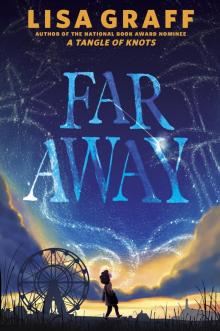 Far Away
Far Away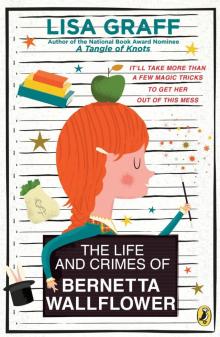 The Life and Crimes of Bernetta Wallflower
The Life and Crimes of Bernetta Wallflower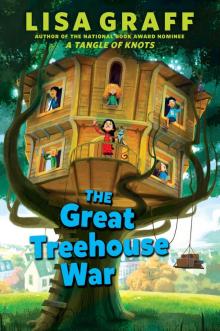 The Great Treehouse War
The Great Treehouse War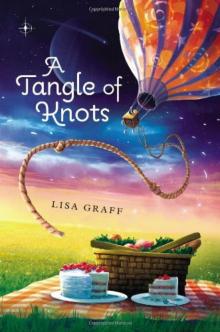 A Tangle of Knots
A Tangle of Knots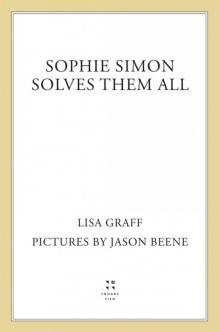 Sophie Simon Solves Them All
Sophie Simon Solves Them All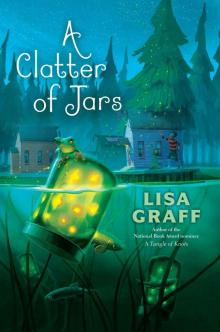 A Clatter of Jars
A Clatter of Jars Double Dog Dare
Double Dog Dare Umbrella Summer
Umbrella Summer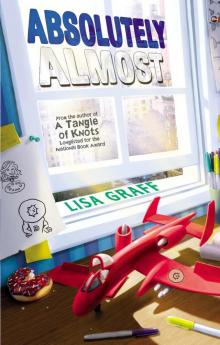 Absolutely Almost
Absolutely Almost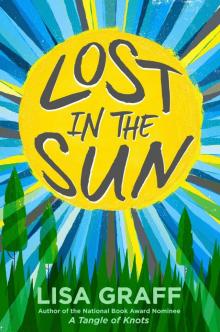 Lost in the Sun
Lost in the Sun